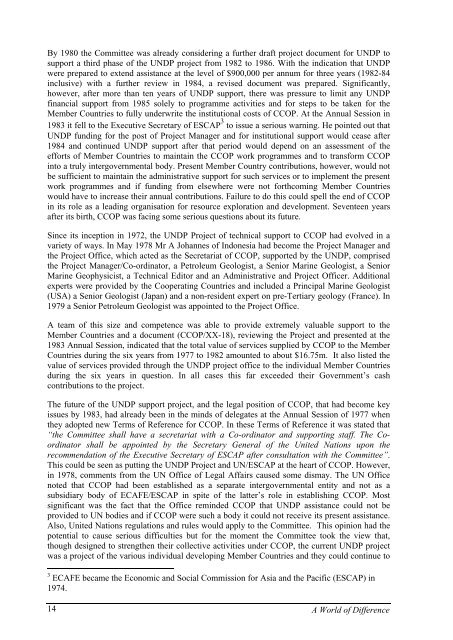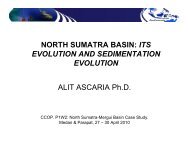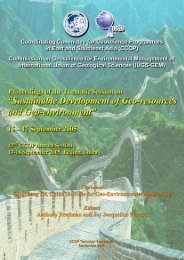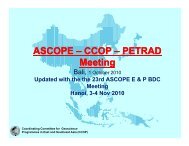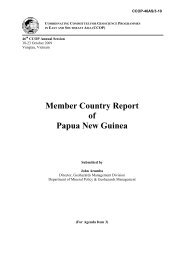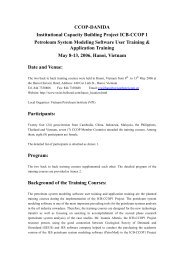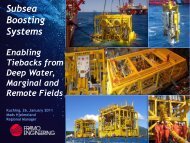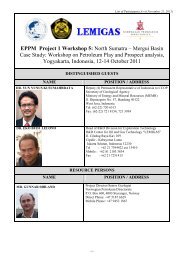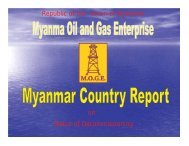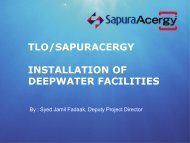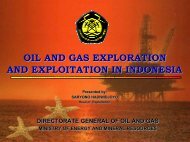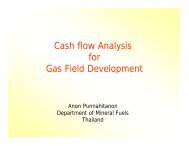Forty Years Of The Coordinating Committee For Geoscience - CCOP
Forty Years Of The Coordinating Committee For Geoscience - CCOP
Forty Years Of The Coordinating Committee For Geoscience - CCOP
Create successful ePaper yourself
Turn your PDF publications into a flip-book with our unique Google optimized e-Paper software.
By 1980 the <strong>Committee</strong> was already considering a further draft project document for UNDP to<br />
support a third phase of the UNDP project from 1982 to 1986. With the indication that UNDP<br />
were prepared to extend assistance at the level of $900,000 per annum for three years (1982-84<br />
inclusive) with a further review in 1984, a revised document was prepared. Significantly,<br />
however, after more than ten years of UNDP support, there was pressure to limit any UNDP<br />
financial support from 1985 solely to programme activities and for steps to be taken for the<br />
Member Countries to fully underwrite the institutional costs of <strong>CCOP</strong>. At the Annual Session in<br />
1983 it fell to the Executive Secretary of ESCAP 3 to issue a serious warning. He pointed out that<br />
UNDP funding for the post of Project Manager and for institutional support would cease after<br />
1984 and continued UNDP support after that period would depend on an assessment of the<br />
efforts of Member Countries to maintain the <strong>CCOP</strong> work programmes and to transform <strong>CCOP</strong><br />
into a truly intergovernmental body. Present Member Country contributions, however, would not<br />
be sufficient to maintain the administrative support for such services or to implement the present<br />
work programmes and if funding from elsewhere were not forthcoming Member Countries<br />
would have to increase their annual contributions. Failure to do this could spell the end of <strong>CCOP</strong><br />
in its role as a leading organisation for resource exploration and development. Seventeen years<br />
after its birth, <strong>CCOP</strong> was facing some serious questions about its future.<br />
Since its inception in 1972, the UNDP Project of technical support to <strong>CCOP</strong> had evolved in a<br />
variety of ways. In May 1978 Mr A Johannes of Indonesia had become the Project Manager and<br />
the Project <strong>Of</strong>fice, which acted as the Secretariat of <strong>CCOP</strong>, supported by the UNDP, comprised<br />
the Project Manager/Co-ordinator, a Petroleum Geologist, a Senior Marine Geologist, a Senior<br />
Marine Geophysicist, a Technical Editor and an Administrative and Project <strong>Of</strong>ficer. Additional<br />
experts were provided by the Cooperating Countries and included a Principal Marine Geologist<br />
(USA) a Senior Geologist (Japan) and a non-resident expert on pre-Tertiary geology (France). In<br />
1979 a Senior Petroleum Geologist was appointed to the Project <strong>Of</strong>fice.<br />
A team of this size and competence was able to provide extremely valuable support to the<br />
Member Countries and a document (<strong>CCOP</strong>/XX-18), reviewing the Project and presented at the<br />
1983 Annual Session, indicated that the total value of services supplied by <strong>CCOP</strong> to the Member<br />
Countries during the six years from 1977 to 1982 amounted to about $16.75m. It also listed the<br />
value of services provided through the UNDP project office to the individual Member Countries<br />
during the six years in question. In all cases this far exceeded their Government’s cash<br />
contributions to the project.<br />
<strong>The</strong> future of the UNDP support project, and the legal position of <strong>CCOP</strong>, that had become key<br />
issues by 1983, had already been in the minds of delegates at the Annual Session of 1977 when<br />
they adopted new Terms of Reference for <strong>CCOP</strong>. In these Terms of Reference it was stated that<br />
“the <strong>Committee</strong> shall have a secretariat with a Co-ordinator and supporting staff. <strong>The</strong> Coordinator<br />
shall be appointed by the Secretary General of the United Nations upon the<br />
recommendation of the Executive Secretary of ESCAP after consultation with the <strong>Committee</strong>”.<br />
This could be seen as putting the UNDP Project and UN/ESCAP at the heart of <strong>CCOP</strong>. However,<br />
in 1978, comments from the UN <strong>Of</strong>fice of Legal Affairs caused some dismay. <strong>The</strong> UN <strong>Of</strong>fice<br />
noted that <strong>CCOP</strong> had been established as a separate intergovernmental entity and not as a<br />
subsidiary body of ECAFE/ESCAP in spite of the latter’s role in establishing <strong>CCOP</strong>. Most<br />
significant was the fact that the <strong>Of</strong>fice reminded <strong>CCOP</strong> that UNDP assistance could not be<br />
provided to UN bodies and if <strong>CCOP</strong> were such a body it could not receive its present assistance.<br />
Also, United Nations regulations and rules would apply to the <strong>Committee</strong>. This opinion had the<br />
potential to cause serious difficulties but for the moment the <strong>Committee</strong> took the view that,<br />
though designed to strengthen their collective activities under <strong>CCOP</strong>, the current UNDP project<br />
was a project of the various individual developing Member Countries and they could continue to<br />
3 ECAFE became the Economic and Social Commission for Asia and the Pacific (ESCAP) in<br />
1974.<br />
14<br />
A World of Difference


